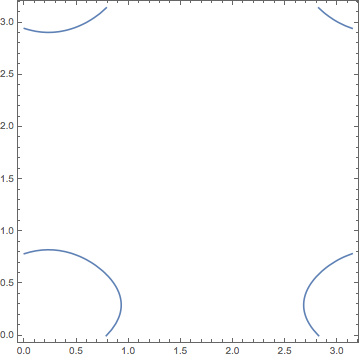What have you tried so far?
You can use Solve to solve for θ.
Solve[a1 Sin[2θ] + a2 Sin[2ϕ] + a3 Cos[2θ] + a4 Cos[2ϕ] == a5, θ] /. _C -> 0
Since your equation have periods π, you can just let ϕ run between 0 and π, and add arbitrary multiples of π to the solutions.
Another way
You can plot it using ContourPlot. I used bounds 0 < θ < π and 0 < ϕ < π since those are the periods.
With[{a1 = 1, a2 = 2, a3 = 2, a4 = 3, a5 = 4},
ContourPlot[a1 Sin[2θ] + a2 Sin[2ϕ] + a3 Cos[2θ] + a4 Cos[2ϕ] == a5, {θ, 0, π}, {ϕ, 0, π}]
]

You can extract the points it found too.
With[{a1 = 1, a2 = 2, a3 = 2, a4 = 3, a5 = 4},
Cases[
ContourPlot[a1 Sin[2θ] + a2 Sin[2ϕ] + a3 Cos[2θ] + a4 Cos[2ϕ] == a5, {θ, 0, π}, {ϕ, 0, π}],
{_Real, _Real}, Infinity]
]
(* {{0.785398,0.},{0.835369,0.0560999},{0.838041,0.0595571},
{0.841498,0.0646637},{0.874146,0.1122},{0.8826,0.127197},
{0.897598,0.158172},{0.902625,0.1683}, <<212>>,
{0.113599,2.91579},{0.1122,2.91602},{0.111224,2.91622},
{0.106423,2.91719},{0.0560999,2.92813},{0.0413688,2.93192},
{0.0206391,2.93783},{0.,2.94422}} *)
You can find more points this way by increasing MaxRecursion.

